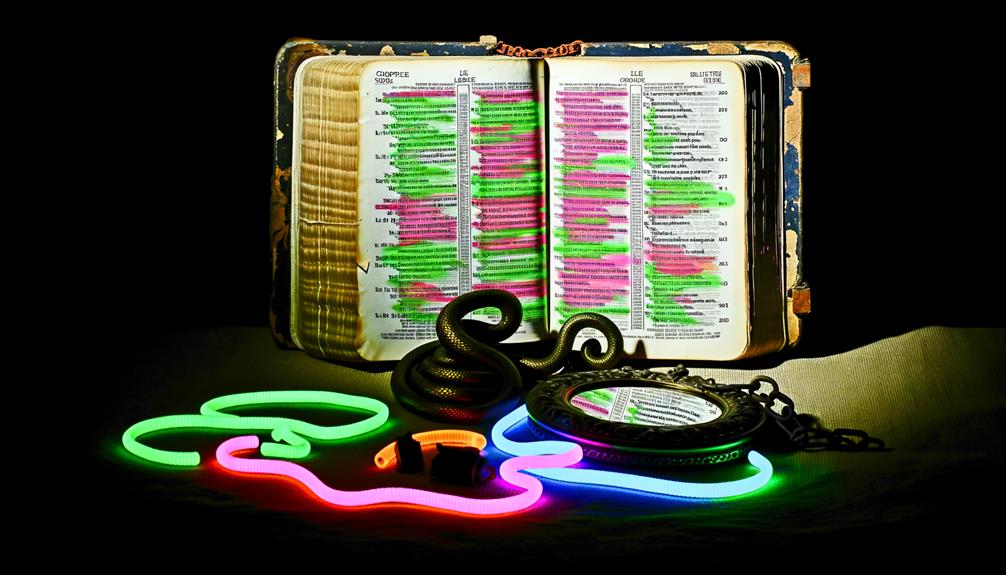Do What Thou Wilt Meaning Bible Verse: Divine Authority
The phrase ‘Do what thou wilt,’ coined by Aleister Crowley, is a key principle in his Thelema philosophy, emphasizing individual freedom and self-actualization. Contrary to this, biblical teachings advocate living according to divine will, with scriptures like Matthew 22:37-39 emphasizing love for God and neighbor, and Romans 12:2 urging transformation through the renewal of the mind to discern God’s will.
This divergence mirrors a broader philosophical debate between personal autonomy and communal responsibility. Exploring this further reveals intricate ethical implications and broader theological contrasts.

Do What Thou Wilt Meaning: Understanding Its Contrast with Biblical Teachings
| Aspect | Description |
|---|---|
| Origin of the Phrase | Popularized by Aleister Crowley in The Book of the Law, associated with Thelema, not the Bible. |
| Common Misconception | Often mistakenly thought to be biblical, but it is not found in Scripture. |
| Philosophical Meaning | Promotes personal freedom, self-will, and doing as one desires without moral or divine constraints. |
| Biblical Contrast | The Bible emphasizes submission to God’s will, not self-will (Matthew 6:10, “Your will be done”). |
| Key Bible Verses | Proverbs 3:5-6 (trust in the Lord), Galatians 5:16-17 (battle between flesh and Spirit), Luke 22:42 (Jesus submits to God’s will). |
| Christian Perspective | Self-centered living contradicts the biblical call to deny oneself and follow Christ (Matthew 16:24). |
| Moral Implications | “Do What Thou Wilt” can lead to moral relativism, while the Bible upholds absolute moral truths. |
| God’s Will in Scripture | Believers are called to seek, discern, and obey God’s will, which leads to true freedom and purpose. |
| Theological Concern | Encouraging self-will over God’s guidance is viewed as spiritually dangerous in Christian doctrine. |
| Related Concepts | Free Will vs. God’s Will, Obedience, Moral Responsibility, Self-Denial, Discipleship, Biblical Authority. |
Origin of the Phrase

The phrase ‘Do what thou wilt‘ originates from the early 20th-century occultist Aleister Crowley, who popularized it as a central tenet of his religious philosophy, Thelema.
Crowley first articulated this maxim in his seminal work, ‘The Book of the Law‘ (1904), where it serves as a guiding principle for individual freedom and self-actualization.
The phrase encapsulates the idea that one’s true will or purpose is paramount, and it should be pursued without external constraints.
This concept reflects a departure from traditional moral and religious frameworks, advocating for a personal spiritual and existential autonomy.
Aleister Crowley’s Philosophy

Aleister Crowley’s philosophy is encapsulated in the central doctrine of Thelema, which posits ‘Do what thou wilt‘ as the foundational ethical imperative.
This principle underpins Thelema’s core tenets, emphasizing personal will, self-discovery, and spiritual freedom.
Crowley’s influence extends into modern occult practices, shaping contemporary esoteric thought and ritualistic traditions.
Crowley’s Central Doctrine
Central to Crowley’s philosophy is the maxim ‘Do what thou wilt,’ which he posits as the essence of true will and individual freedom. This principle, derived from his interpretation of ancient esoteric traditions, emphasizes the discovery and execution of one’s unique purpose.
Crowley argued that adherence to this doctrine would lead to spiritual enlightenment and societal harmony. His teachings challenge conventional moral constraints, urging individuals to transcend societal norms in pursuit of their true will. This concept is foundational to his broader system of thought, which he elaborated in various writings.
| Aspect | Description |
|---|---|
| True Will | The unique, divinely inspired purpose of an individual |
| Individual Freedom | The liberation from societal and moral constraints |
| Spiritual Enlightenment | Achieved through the adherence to one’s true will |
Thelema’s Core Principles
Among the fundamental tenets of Thelema are the concepts of True Will, the Law of Thelema, and the pursuit of spiritual enlightenment through personal experience and self-discovery. These principles form the core of Aleister Crowley’s philosophy, emphasizing individual freedom and personal responsibility.
Thelema encourages adherents to seek their True Will, an inherent purpose or path unique to each individual. The Law of Thelema, encapsulated by the phrase ‘Do what thou wilt,’ asserts that one should follow their True Will without external interference.
Key principles include:
- True Will: Discovering and following one’s unique purpose.
- Freedom: Emphasizing personal liberty and autonomy.
- Spiritual Enlightenment: Achieved through experiential knowledge.
This framework is intended to guide adherents towards a harmonious and purposeful existence.
Influence on Modern Occult
Building upon these core principles, Crowley’s philosophy has greatly shaped modern occult practices and esoteric traditions. His doctrine of “Do what thou wilt” serves as a foundation for various contemporary spiritual movements.
Crowley’s emphasis on individual will and personal spiritual authority has permeated diverse occult groups, influencing everything from ritualistic practices to metaphysical ideologies. The integration of Thelema into modern esotericism can be seen in the following areas:
| Aspect | Influence | Examples |
|---|---|---|
| Ritual Magic | Structured Ceremonies | Golden Dawn, OTO |
| Esoteric Literature | Philosophical Texts | “The Book of the Law” |
| Personal Development | Self-Realization Methods | Chaos Magic, New Age |
| Symbolism | Iconographic Elements | Tarot, Kabbalistic symbols |
This table illustrates Crowley’s enduring influence on contemporary occultism.
Common Misinterpretations

A prevalent misinterpretation of ‘Do What Thou Wilt’ is the notion that it endorses unrestrained hedonism without regard for ethical or moral considerations. This interpretation often stems from a superficial reading of Aleister Crowley’s work, neglecting its deeper philosophical context.
Crowley intended it as a call for individuals to discover and follow their true purpose or ‘True Will,’ not as an excuse for licentious behavior.
Common misconceptions include:
- Equating it solely with self-indulgence: Overlooking its spiritual and philosophical dimensions.
- Ignoring the concept of True Will: Misunderstanding the term as mere personal desire.
- Assuming moral relativism: Believing it rejects all ethical frameworks.
Such misinterpretations can obscure the nuanced intentions behind the phrase.
Biblical Principles Overview

To thoroughly understand the concept of ‘Do What Thou Wilt,’ it is essential to examine the underlying Biblical principles that often contrast with this philosophy.
Biblical teachings emphasize obedience to God’s commandments, humility, and selflessness. Key principles include the Ten Commandments, which provide a moral framework, and the teachings of Jesus, who emphasized love for God and neighbor (Matthew 22:37-39).
The Bible advocates for living in accordance with divine will rather than personal desire, promoting virtues such as charity, patience, and sacrifice. This perspective encourages individuals to seek a higher purpose beyond their own ambitions, focusing on service to others and fostering a sense of community. Faith, as emphasized in biblical teachings, empowers believers to overcome challenges and find strength in moments of adversity. In this context, the meaning of Philippians 4:13—”I can do all things through Christ who strengthens me”—serves as a reminder that reliance on divine support can lead to the fulfillment of one’s spiritual calling.
The Apostle Paul further underscores this in Romans 12:2, advising believers to avoid conforming to worldly patterns and to seek transformation through the renewal of mind, aligning actions with God’s perfect will.
Scripture Analysis

In considering the phrase ‘Do What Thou Wilt‘ within a scriptural context, it is essential to explore its alignment or divergence from Biblical teachings.
By examining interpretative variations, one can assess how different theological perspectives either reconcile or contest this concept with core Biblical principles.
Such an analysis offers a nuanced understanding of the ethical and spiritual implications inherent in both the phrase and the scriptures.
Biblical Context Exploration
Examining the phrase ‘Do what thou wilt’ through the lens of Biblical Scripture necessitates a thorough analysis of relevant texts to discern its alignment or contrast with Christian theological principles.
This exploration involves scrutinizing various passages that emphasize divine will, moral freedom, and human responsibility.
Key Biblical texts highlight:
- Romans 12:2: Urges transformation through the renewal of mind to discern God’s will.
- Galatians 5:13: Warns against using freedom as an opportunity for self-indulgence but for serving others.
- Matthew 6:10: The Lord’s Prayer emphasizes submission to God’s will.
These scriptures collectively underscore a life guided by divine principles, not autonomous will.
Interpretative Variations Explained
Although the phrase ‘Do what thou wilt‘ is often associated with libertarian ideals, its interpretation can greatly vary when contrasted with the prescriptive moral frameworks presented in Biblical scripture.
Within the Bible, moral directives are frequently emphasized, such as in the Ten Commandments and the teachings of Jesus, which advocate for love, compassion, and self-restraint.
This stands in stark contrast to the seemingly unbounded individualism suggested by ‘Do what thou wilt’.
The divergence in these perspectives highlights a fundamental difference in worldviews: one that prioritizes communal and ethical obligations, and another that champions personal freedom.
Analyzing these variations allows for a deeper understanding of how different philosophical and religious paradigms interpret the concept of human will and moral action.
Comparative Teachings

While Aleister Crowley’s maxim ‘Do what thou wilt’ is often associated with Thelema, its philosophical underpinnings can be contrasted with ethical principles found in other major religious and philosophical systems.
Christianity emphasizes altruistic love and sacrifice, encapsulated in the Golden Rule: ‘Do unto others as you would have them do unto you’ (Matthew 7:12).
In contrast, Buddhism advocates for the Eightfold Path, promoting right action and mindfulness. Islam’s ethical framework is grounded in Sharia, emphasizing duties to God and society.
Ultimately, Kantian ethics, rooted in deontological principles, focuses on adherence to moral laws and universal maxims.
- Christianity: The Golden Rule.
- Buddhism: The Eightfold Path.
- Islam: Sharia.
These diverse teachings offer nuanced perspectives on moral conduct.
Modern Perspectives

Modern perspectives on Aleister Crowley’s dictum ‘Do what thou wilt‘ explore its implications within contemporary ethical, psychological, and sociocultural frameworks.
Ethically, this maxim is scrutinized for its potential to promote individualism at the expense of collective responsibility.
Psychologically, it resonates with modern concepts of self-actualization and personal freedom, encouraging individuals to pursue their true will.
Socioculturally, it challenges traditional norms and invites discourse on the balance between personal liberty and social harmony.
Critics argue that unchecked freedom could lead to moral relativism, while proponents highlight its capacity to empower and liberate.
Consequently, contemporary interpretations of Crowley’s principle necessitate a nuanced understanding of its application in a multifaceted world.
Conclusion
The phrase ‘do what thou wilt,’ originating from Aleister Crowley’s philosophy, often raises eyebrows when juxtaposed with biblical teachings.
A thorough examination reveals stark contrasts between Crowley’s hedonistic tenets and the Bible’s moral imperatives. Misinterpretations abound, muddying the waters for those seeking clarity.
Comparative analysis and modern perspectives underscore these differences, showcasing the enduring relevance of scriptural principles.
Ultimately, the adage ‘the proof is in the pudding’ aptly illustrates that actions aligned with biblical teachings yield discernible, positive outcomes.






